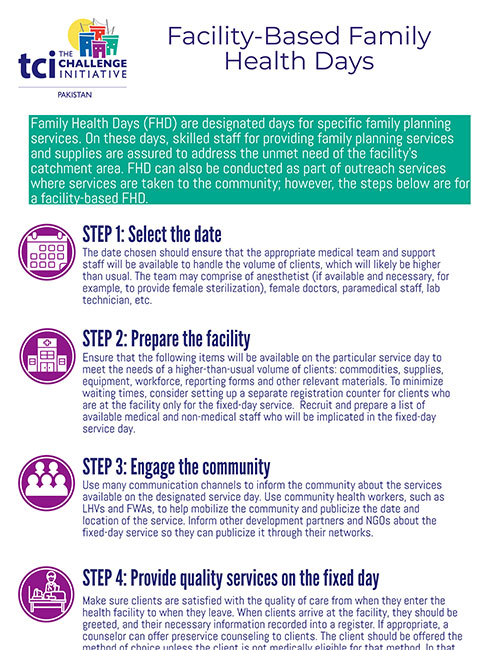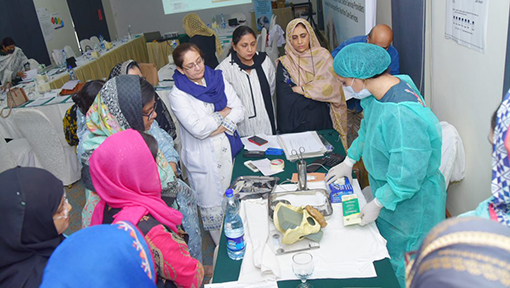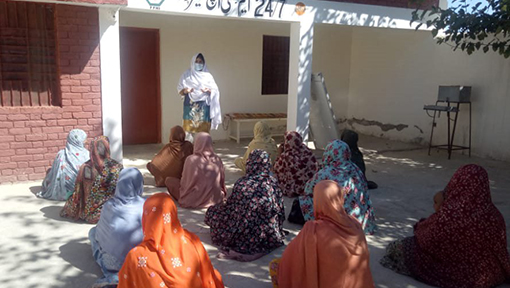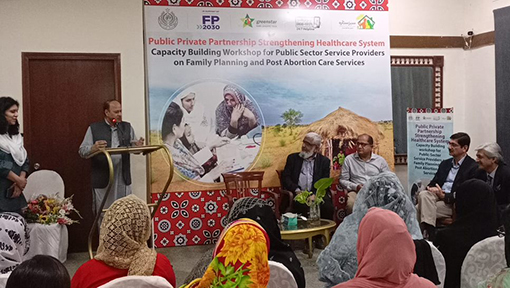Pakistan: Service Delivery
- Home
- Help and Support
- Close
- Toolkits
- Global Toolkit
- AYSRH Toolkit
- Hub Toolkits
- Core High-Impact Practices
- Gender Essentials Mini Course
- Close
- Resource Collection
- Community of Practice
- Coaching
- Log In/Register
- My Profile
- English
Facility-Based Family Health Days
What Is a Facility-Based Family Health Day?

In Pakistan, every district committee has its designated schedule for outreach programs to cater to family planning needs. Generally, a Wednesday is designated as a “Family Health Day” (FHD) to provide specific family planning services. An FHD for assured family planning (FP) service provision enhances women’s and young married girls’ access to family planning, thus, it is considered gender intentional.
A FHD can be integrated with outreach via medical camps and mobile service units (MSUs) to complement routine family planning service provision by offering a method typically not provided at the facility or by guaranteeing routine family planning service on a specific day. The non-surgical services are provided by a Family Welfare Worker (FWW). In contrast, the male and female Family Welfare Assistants (FWA) conduct door-to-door activities to create demand for FHDs.
Similarly, a FHD is sometimes conducted within the facility to address unmet family planning needs, also referred to as an in-reach or facility-based FHD. This approach describes the implementation steps for a facility-based FHD.
What are the benefits?
- Facilities can galvanize their quality improvement efforts around a specific day, service and time.
- Individuals are guaranteed to receive the family planning services they come for after screening for medical eligibility.
- Clients may appreciate a schedule of specific services, for example, that intrauterine devices (IUDs) are offered on Wednesdays of every month and on special internationally observed days, such as World Population Day, World Health Day and World Contraceptive Day to help them plan when to get the specific method they want.
- Scheduled days allow trained LARC providers to provide supportive supervision and on-the-job training support to newly trained providers, thus extending the pool of LARC providers in each area.
- As facilities demonstrate the reliability of service delivery on special days, clients’ confidence in the facilities and providers improves, improving their chances of returning for other services.
How to implement
Step 1: Select a Date
The date chosen should ensure that the appropriate medical team and support staff will be available to handle the volume of clients, which will likely be higher than usual. The team may comprise of:
- Anesthetist (if available and necessary, for example, to provide female sterilization)
- Female doctors
- Paramedical staff
- Lab technician
- Counsellor
- Sweeper
Step 2: Prepare the Facility
At a minimum, ensure that the following items will be available on the particular service day to meet the needs of a higher-than-usual volume of clients: commodities, supplies, equipment, workforce, reporting forms and other relevant materials. To minimize waiting times, you may consider setting up a separate registration counter for clients who are at the facility for the fixed-day service rather than those who are there for other services.
Recruit and prepare a list of available medical and non-medical staff who will be implicated in the fixed-day service day. In places where a facility does not have appropriately trained medical/paramedical staff to assist with the provision of family planning services, qualified staff from another facility should be recruited for that day. Ensure availability of commodities and supplies; this includes contraceptive stock, medical equipment and other consumables. Make sure you have infection prevention supplies available as well.
Step 3: Engage the Community
Use many communication channels to inform the community about the services available on the designated service day. Use community health workers, such as LHVs and FWAs, to help mobilize the community and publicize the date and location of the service. Inform other development partners and NGOs about the fixed-day service so they can publicize it through their networks.
Step 4: Provide Quality Services on the Fixed Day
Make sure clients are satisfied with the quality of care from when they enter the health facility to when they leave. When clients arrive at the facility, they should be greeted, and their necessary information recorded into a register. If appropriate, a counselor can offer preservice counseling to clients. During the consultation, the provider should provide client-centered care and services to the client.
The client should be offered the method of choice unless the client is not medically eligible for that method. In that case, the provider should offer appropriate counseling to help the client choose another suitable method. If appropriate, the client should receive any post-procedure counseling, such as counseling about possible side effects and early warning signs that require medical attention and scheduling any necessary follow-up appointments.
Step 5: Monitor Progress
- Number of fixed days planned compared with the number of fixed days held
- Number of new family planning acceptors recruited through such days
- Number of women who switch from short-acting methods to long-acting reversible contraceptives or permanent methods
- Number of women continuing family planning methods due to these special days
- Total number of women benefiting from family planning services on these special days
- Number of family planning clients served through fixed-day services, by method mix distribution
- Percentage of family planning clients served through fixed-day services to the total family planning clients served, by method and by month
Indicators for success
- Number of fixed days planned compared with the number of fixed days held
- Number of new family planning acceptors recruited through such days
- Number of women who switch from short-acting methods to long-acting reversible contraceptives or permanent methods
- Number of women continuing family planning methods due to these special days
- Total number of women benefiting from family planning services on these special days
- Number of family planning clients served through fixed-day services, by method mix distribution
- Percentage of family planning clients served through fixed-day services to the total family planning clients served, by method and by month
TCI APP USERS PLEASE NOTE
You will only receive CERTIFICATES by email – when earning a score above 80% – and will not be able to view or print a certifcate PDF from the TCI app.
Test Your Knowledge
Earn a Certificate
Quiz Summary
0 of 3 Questions completed
Questions:
Information
You have already completed the quiz before. Hence you can not start it again.
Quiz is loading…
You must sign in or sign up to start the quiz.
You must first complete the following:
Results
Results
0 of 3 Questions answered correctly
Time has elapsed
You have reached 0 of 0 point(s), (0)
Earned Point(s): 0 of 0, (0)
0 Essay(s) Pending (Possible Point(s): 0)
Categories
- Not categorized 0%
- 1
- 2
- 3
- Current
- Review
- Answered
- Correct
- Incorrect
-
Question 1 of 3
1. Question
What are some of the benefits of fixed-day service provision for family planning?
-
Question 2 of 3
2. Question
What day is designated in Pakistan, especially for Sindh Province, for FHD:
-
Question 3 of 3
3. Question
FHD is only an in-reach activity.
Pakistan Service Delivery Interventions
Tips
- Preplanning is key to the success of the fixed-day service. Ensure you have reviewed and addressed all possible complications that could happen on the day, such as the registration process and stocking all necessary supplies and equipment.
- Designating a team to organize the day can distribute the responsibilities and ensure nothing gets missed.
- Ensure community awareness of the day by publicizing the service schedule widely and using communication reminders like handbills and newspaper inserts or ads
- Collection of detailed data (demographics, age, internally displaced person status, for example) is also essential for funding and reflection in the SDGs
Challenges
- Make sure that the demand generated can be met with the services provided.
- The cost of providing free services in private sector facilities may be prohibitive to the program and should be planned far in advance with the appropriate authorities within the health system.
- Follow-up for women benefitting from this service may be challenging. One solution is to transfer the medical files to the woman’s facility of choice.







